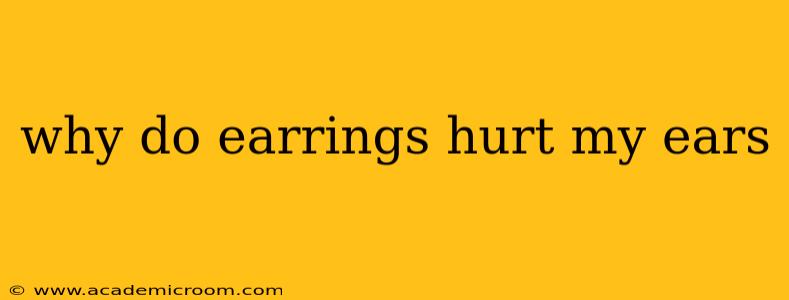Earring pain is a common complaint, especially after a new piercing. However, even established piercings can cause discomfort. Understanding the reasons behind this pain is crucial for proper aftercare and preventing future problems. This guide delves into the various causes of earring pain, offering solutions and advice to alleviate discomfort.
What Causes Earring Pain?
Several factors can contribute to painful ears from earrings. Let's break down the most common culprits:
1. Infections:
This is one of the most serious reasons for ear pain. An infected piercing will exhibit symptoms beyond just pain. You might notice:
- Pus or discharge: This is often yellow or green.
- Increased redness and swelling: The area around the piercing will be noticeably inflamed.
- Warmth to the touch: The infected area will feel hotter than the surrounding skin.
- Increased pain: The pain will likely be throbbing and severe.
If you suspect an infection, see a doctor immediately. Delaying treatment can lead to serious complications.
2. Irritation from Earrings:
The material of your earrings, their size, and how they're worn can all cause irritation.
- Nickel allergy: Nickel is a common allergen found in many inexpensive jewelry. It can cause a reaction ranging from mild itching to severe inflammation and pain.
- Material sensitivity: Some individuals react to other metals, such as gold (though less common), or even certain types of plastics.
- Earrings too tight or too loose: Tight earrings can restrict blood flow, causing pain and inflammation. Loose earrings can move around, irritating the piercing site.
- Rough or poorly made earrings: The edges of poorly crafted earrings can snag on the piercing, causing discomfort and potential tearing.
3. Improper Aftercare:
Neglecting proper aftercare after getting your ears pierced is a significant cause of pain and infection. This includes:
- Not cleaning the piercing: Bacteria can easily build up, leading to infection.
- Touching the piercing with unclean hands: This introduces bacteria to the healing wound.
- Rotating earrings too frequently or aggressively: This can disrupt the healing process and cause unnecessary irritation.
4. Keloid Formation:
Keloids are raised scars that form when the body produces excessive collagen during wound healing. They can be painful, itchy, and unsightly. They are more common in individuals with darker skin tones.
5. Piercing Problems:
- Improper piercing technique: A poorly placed or improperly executed piercing can lead to long-term pain and complications.
- Underlying medical conditions: Certain medical conditions can affect healing and increase the risk of infection or complications.
Why Do My Ears Hurt After Getting Them Pierced? (Addressing a PAA Question)
The pain after getting your ears pierced is normal, at least to a degree. The initial pain is from the needle, and then some tenderness and swelling are common as your body heals the puncture wound. However, severe or persistent pain isn't normal. It could signal an infection or reaction to the jewelry. Follow your piercer's aftercare instructions meticulously to minimize discomfort.
How Can I Stop My Ears From Hurting? (Addressing a PAA Question)
Managing earring pain depends on the cause:
- Infection: See a doctor immediately. They might prescribe antibiotics.
- Irritation: Change to hypoallergenic earrings (like nickel-free surgical steel or titanium), and ensure they are the right size and fit.
- Improper aftercare: Start a proper cleaning routine using a saline solution as recommended by your piercer. Avoid touching the piercing unnecessarily.
- Keloids: Consult a dermatologist. Treatment options may include steroid injections or surgical removal.
What Kind of Earrings Should I Wear if My Ears Hurt? (Addressing a PAA Question)
If your ears hurt, opt for hypoallergenic earrings made from materials such as:
- Surgical steel: This is a very common and safe choice for new piercings.
- Titanium: Another excellent hypoallergenic metal.
- 14k or 18k gold: These are less likely to cause reactions than lower karat gold.
Avoid cheaper jewelry that might contain nickel or other irritating metals, especially if you're experiencing pain.
Disclaimer: This information is for general knowledge and does not constitute medical advice. Always consult a healthcare professional for any concerns about your health or piercing.
